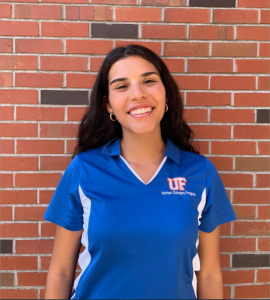 In this article, we welcome Sofia Acevedo to FSHN Research Journeys, which follows the research of graduate students in the Food Science and Human Nutrition program at The University of Florida. Sofia is a first-year graduate student working toward her Ph.D. in nutritional sciences under the mentorship of Dr. Jeanette Andrade. In her research project, Sofia aims to alleviate the disease burden of chronic kidney disease with anti-inflammatory spices. Read on to learn about how she will develop an easy-to-consume product for patients, as well as her commitment to providing healthcare to people from all backgrounds.
In this article, we welcome Sofia Acevedo to FSHN Research Journeys, which follows the research of graduate students in the Food Science and Human Nutrition program at The University of Florida. Sofia is a first-year graduate student working toward her Ph.D. in nutritional sciences under the mentorship of Dr. Jeanette Andrade. In her research project, Sofia aims to alleviate the disease burden of chronic kidney disease with anti-inflammatory spices. Read on to learn about how she will develop an easy-to-consume product for patients, as well as her commitment to providing healthcare to people from all backgrounds.
Sofia:
Kate is an older adult with chronic kidney disease who must receive dialysis three times a week to remove waste from her blood. These dialysis sessions typically run three to four hours, which does not include her travel time. Thus, she spends much of her day getting treatment.
On this day, Kate just finished her dialysis session. Her energy levels are very low, and she suffers from nausea, so she puts off eating until later, choosing instead to rest. Soon much of the day is gone. Kate is too tired to cook a healthy meal and often has no budget to eat out at a restaurant with healthy offerings. Kate might order a meal from a fast-food restaurant or eat a processed, packaged meal. Either of these choices lacks the nutrition Kate needs to boost her energy and maintain her long-term health.
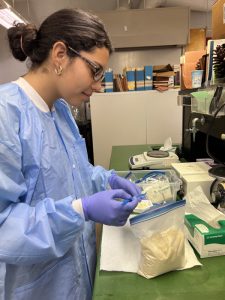
Every day, many people suffering from chronic kidney disease find themselves in Kate’s circumstances. As a healthier alternative to fast food, what if we could provide easy, nutritious snacks for these patients when they lack time and energy? For example, Kate could enjoy a muffin loaded with spices that will help her reduce disease-related inflammation and improve her quality of life.
Inflammation in Chronic Kidney Disease
Chronic kidney disease (CKD) is characterized as a low-grade inflammatory state that reduces kidney function and contributes to structural kidney damage.1 CKD has five stages, and as it progresses into advanced stages (3-5D), inflammation worsens.2 This inflammation is attributed to the presence of cytokines, acidosis, and oxidative stress. Common comorbidities of CKD, such as diabetes, hypertension, and atherosclerosis, contribute to this inflammation.3 CKD has a high disease burden, which is defined by the impact of a health problem as measured by financial cost, mortality, morbidity, or other indicators.
Ideally, inflammation in these patients would be treated by treating the primary cause of it. However, due to the complexity of CKD and the many factors involved in the modulation of inflammation, treatment regimens are usually directed against mediators of the inflammatory process. The more common regimens are through dietary modulation or through pharmacotherapy.3
Diet recommendations for someone with CKD are based on the stage of disease progression, co-morbidities, and laboratory values. Typically, CKD patients must monitor their intakes of sodium, potassium, phosphorus, and protein to mitigate disease progression and complications associated with this disease. However, dietary compliance can be challenging due to cultural preferences, as well as the availability and affordability of foods.5-7 Therefore, proposing a comprehensive dietary control approach is unrealistic for this population. Likewise, the disease burden accompanying dialysis can make patients aversive to the pharmacological tools often prescribed for inflammation, such as NSAIDs.
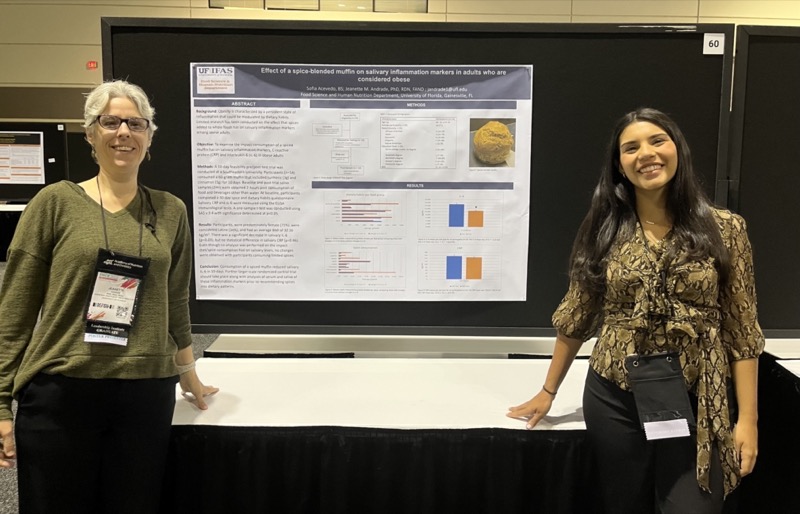
Sofia’s Journey to Nutritional Sciences
I grew up in Venezuela where the concept of food-as-medicine was prevalent. One of my most impactful childhood memories was my grandmother telling her friend, who could not afford hypertension medication, to eat fatty fish. Living in a country where finding medicine was a privilege, my grandmother developed an ability to use food-as-medicine to help everyone around her, including my parents and me.

At the time, I did not know that the seemingly simple concept of using food to treat the body would follow me into adulthood. Like my grandmother, I strive to help those who suffer from health disparities and who have unequal access to medicine find affordable alternatives.
I was initially drawn to the CKD population because of the complexity of the disease. What made me continue to study it was a desire to understand the cyclic pattern of the disease. Patients undergoing dialysis often have low energy because of the treatment. As a result, they don’t have the energy to make changes to their diet or start being more active. As healthcare professionals, it is our job to find a way to break this cycle, and I believe we can do so through well-designed nutrition tools.
The Power of Food for Those Who Need It
The typical treatment for inflammation in CKD is the use of NSAIDs, NRF2 inhibitors and regulators, and corticosteroids.8,9 However, these treatments only worsen the disease burden for patients with CKD, especially those already in dialysis. As an alternative to these pharmacotherapies, incorporating spices into a healthy diet may reduce inflammation. We want to determine which active components in spices have the most effect on inflammation, as well as develop consumer-friendly strategies to encourage patients to include them in their diets.
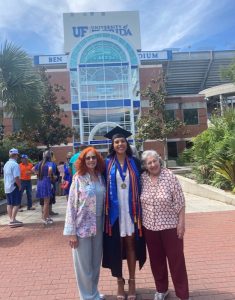
To start, we will conduct a focus group evaluating spice preferences in foods and beverages. We will ask questions about spice consumption and taste preferences around specific products. Results from this focus group will aid in developing a spice-infused product to test in a clinical trial.
From there, the goal is to create an easy-to-consume product in the form of a snack or beverage with high levels of anti-inflammatory bioactives. With that product, we would then conduct a randomized-controlled trial with patients in the early stages of CKD (before dialysis, stages 2-4) to measure both the effect on inflammation and the level of compliance in the population. We believe studying inflammation and the capacity to modulate it in the early stages of CKD might be helpful in the long run for decreasing disease progression.
To measure inflammation, we will focus on Il-6, CRP, and TNF-a, which are the most common markers used in the literature to measure inflammation.10 Participants will be interviewed after the trial to assess if the product was well received, if it fits into their schedules, if they were inclined to eat it without the pressure of the study, and if they would implement this habit into their daily life.
Looking to the Future: Can We Decrease Inflammation and Disease Burden at the Same Time?
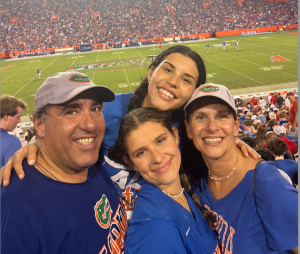
This population suffers a large disease burden. Finding alternative ways in which they can improve aspects of their disease, such as high levels of inflammation, is important. We hope to find a strategy that accommodates the rigid dietary restrictions for those with CKD but is also well-received by the population.
One challenge we foresee when carrying out this project will be recruitment in our population of interest. Since non-dialysis CKD patients have fewer checkup appointments, they might lose interest in participating in a research study that requires constant check-in. A possible solution for this is offering incentives for participation so they feel more motivated to stay compliant with the protocol.
With all of this in mind, we hope to create a feasible solution through the inclusion of spices in the diet as a snack or beverage. We aim to develop a product that is easy to include in their daily routine, does not take much time and energy, and does not feel like another medicine they have to take. As a result, we will give patients like Kate a lifestyle tool to reduce disease burden and inflammation, all at the same time.
Sofia Acevedo is a first-year graduate student working towards her Ph.D. in nutritional sciences. She earned her undergraduate degree in dietetics at the University of Florida and is now studying inflammation in chronic kidney disease in Dr. Jeanette Andrade‘s lab.

References
- Webster AC, Nagler EV, Morton RL, Masson P. Chronic Kidney Disease. Lancet. Mar 25 2017;389(10075):1238-1252. doi:10.1016/s0140-6736(16)32064-5
- Zoccali C, Vanholder R, Massy ZA, et al. The systemic nature of CKD (vol 13, pg 344, 2017). Nature Reviews Nephrology. Jun 2017;13(6)
- Saran R, Robinson B, Abbott KC, et al. US Renal Data System 2018 Annual Data Report: Epidemiology of Kidney Disease in the United States. Am J Kidney Dis. Mar 2019;73(3 Suppl 1):A7-a8. doi:10.1053/j.ajkd.2019.01.001
- Chan M, Kelly J, Tapsell L. Dietary Modeling of Foods for Advanced CKD Based on General Healthy Eating Guidelines: What Should Be on the Plate? American Journal of Kidney Diseases. Mar 2017;69(3):436-450. doi:10.1053/j.ajkd.2016.09.025
- Lambert K, Mullan J, Mansfield K. An integrative review of the methodology and findings regarding dietary adherence in end-stage kidney disease. Bmc Nephrology. Oct 2017;18318. doi:10.1186/s12882-017-0734-z
- Pereira RA, Ramos CI, Teixeira RR, Muniz GAS, Claudino G, Cuppari L. Diet in Chronic Kidney Disease: an integrated approach to nutritional therapy. Revista Da Associacao Medica Brasileira. 2020;66:S59-S67. doi:10.1590/1806-9282.66.s1.59
- Opiyo RO, Nyasulu PS, Olenja J, et al. Factors associated with adherence to dietary prescription among adult patients with chronic kidney disease on hemodialysis in national referral hospitals in Kenya: a mixed-methods survey. Renal Replacement Therapy. Sep 2019;5(1)41. doi:10.1186/s41100-019-0237-4
- Silverstein DM. Inflammation in chronic kidney disease: role in the progression of renal and cardiovascular disease. Pediatric Nephrology. Aug 2009;24(8):1445-1452. doi:10.1007/s00467-008-1046-0
- Cuadrado A, Rojo AI, Wells G, et al. Therapeutic targeting of the NRF2 and KEAP 1 partnership in chronic diseases. Nature Reviews Drug Discovery. Apr 2019;18(4):295-317. doi:10.1038/s41573-018-0008-x
- Akchurin OM, Kaskel F. Update on Inflammation in Chronic Kidney Disease. Blood Purification. 2015;39(1-3):84-92. doi:10.1159/000368940
Looking for more posts exploring graduate research projects in the FSHN Department at the University of Florida?
Dive into the Research Journeys of other graduate students below.
M.S. Food Science
M.S. Nutritional Sciences
Ph.D. Food Science
Ph.D. Nutritional Sciences
 2
2
